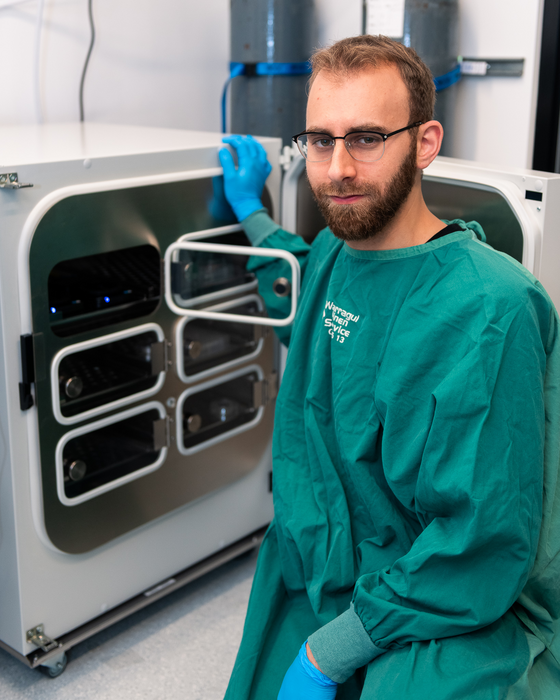The time has come to create a new kind of computer, say researchers from John Hopkins University together with Dr Brett Kagan, chief scientist at Cortical Labs in Melbourne, who recently led development of the DishBrain project, in which human cells in a petri dish learnt to play Pong.

Credit: Cortical Labs
The time has come to create a new kind of computer, say researchers from John Hopkins University together with Dr Brett Kagan, chief scientist at Cortical Labs in Melbourne, who recently led development of the DishBrain project, in which human cells in a petri dish learnt to play Pong.
In an article published today in Frontiers in Science, the team outlines how biological computers could surpass today’s electronic computers for certain applications while using a small fraction of the electricity required by today’s computers and server farms.
They’re starting by making small clusters of 50,000 brain cells grown from stem cells and known as organoids. That’s about a third the size of a fruit fly brain. They’re aiming for 10 million neurons which would be about the number of neurons in a tortoise brain. By comparison, the average human brain has more than 80 billion neurons.
The article highlights how the human brain continues to massively outperform machines for particular tasks. Humans, for example, can learn to distinguish two types of objects (such as a dog and a cat) using just a few samples, while AI algorithms need many thousands. And while AI beat the world champion in Go in 2016, it was trained on data from 160,000 games – the equivalent of playing for five hours each day, for more than 175 years.
Brains are also more energy efficient. Our brains are thought to be able to store the equivalent of more than a million times the capacity of an average home computer (2.5 petabytes), using the equivalent of just a few watts of power. US data farms, by contrast, use more than 15,000 megawatts a year, much of it generated by dozens of coal-fired power stations.
In the paper, the authors outline their plan for “organoid intelligence”, or OI, with the brain organoids grown in cell-culture. Although brain organoids aren’t “mini brains”, they share key aspects of brain function and structure. Organoids would need to be dramatically expanded from around 50,000 cells currently. “For OI, we would need to increase this number to 10 million,” says senior author Prof Thomas Hartung of Johns Hopkins University in Baltimore.
Brett and his colleagues at Cortical Labs have already demonstrated that biocomputers based on human brain cells are possible. A recent paper in Neuron showed that a flat culture of brain cells could learn to play the video game Pong.
“We have shown we can interact with living biological neurons in such a way that compels them to modify their activity, leading to something that resembles intelligence,” says Kagan of the relatively simple Pong-playing DishBrain. “Working with the team of amazing people assembled by Professor Hartung and colleagues for this Organoid Intelligence collaboration, Cortical Labs is now trying to replicate that work with brain organoids.”
“I would say that replicating [Cortical Labs’] experiment with organoids already fulfils the basic definition of OI,” says Thomas.
“From here on, it’s just a matter of building the community, the tools, and the technologies to realise OI’s full potential,” he said.
“This new field of biocomputing promises unprecedented advances in computing speed, processing power, data efficiency, and storage capabilities – all with lower energy needs,” Brett says. “The particularly exciting aspect of this collaboration is the open and collaborative spirit in which it was formed. Bringing these different experts together is not only vital to optimise for success but provides a critical touch point for industry collaboration.”
And the technology could also enable scientists to better study personalised brain organoids developed from skin or small blood samples of patients suffering from neural disorders, such as Alzheimer’s disease, and run tests to investigate how genetic factors, medicines, and toxins influence these conditions.
Journal
Frontiers in Science
DOI
10.3389/fsci.2023.1017235
Method of Research
Commentary/editorial
Subject of Research
Cells
Article Title
Organoid intelligence (OI): the new frontier in biocomputing and intelligence-in-a-dish
Article Publication Date
28-Feb-2023
COI Statement
TH is named inventor on a patent by Johns Hopkins University on the production of brain organoids, which is licensed to AxoSim, New Orleans, LA, United States, and receives royalty shares. TH and LS consult AxoSim. JS is named as inventor on a patent by the University of Luxembourg on the production of midbrain organoids, which is licensed to OrganoTherapeutics SARL, Esch-sur-Alzette, Luxembourg. JS is also co-founder and shareholder of OrganoTherapeutics SARL. AM is a co-founder and has equity interest in TISMOO, a company dedicated to genetic analysis and human brain organogenesis, focusing on therapeutic applications customized for autism spectrum disorders and other neurological disorders with genetic origins. The terms of this arrangement have been reviewed and approved by the University of California, San Diego, in accordance with its conflict of interest policies. BK is an inventor on patents for technology related to this paper along with being employed at and holding shares in Cortical Labs Pty Ltd, Melbourne, Australia. No specific funding or other incentives were provided for involvement in this publication.
The remaining authors declare that the research was conducted in the absence of any commercial or financial relationships that could be construed as a potential conflict of interest.




